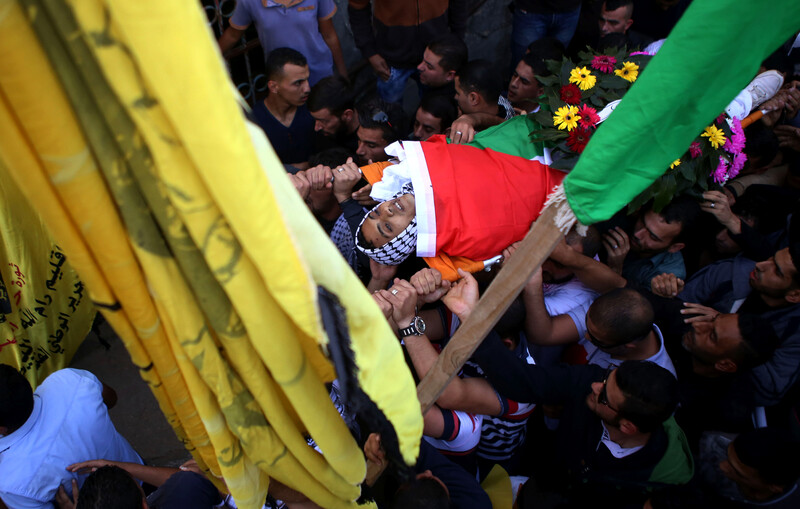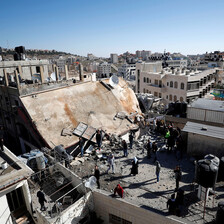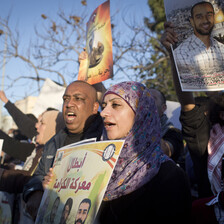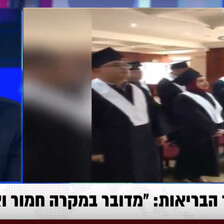The Electronic Intifada Budrus 20 November 2015

The 14 November funeral of Lafi Awad, who was killed by Israeli occupations forces.
APA imagesLafi Awad was not yet 10 when he began taking part in protests.
The protests erupted in 2004 as it became plain that the wall Israel was building in the West Bank would divide his home village of Budrus. His family were among the Palestinians whose olive trees were earmarked for destruction as Israel confiscated much of the village’s land.
Lafi belonged to a generation that was politicized by Israel’s wall. He felt an urgent need to take action against the dispossession it was causing.
He resisted the Israeli occupation by throwing stones. His determination to keep resisting cost him his life.
“When he first asked to join us in the clashes with the Israeli soldiers, we did not take him seriously,” said Ahmad Awad, Lafi’s best friend and who is three years his senior. “I told him that he was too young and small to protest. But he insisted and we were all taken aback with his courage. He was fearless beyond his age.”
The confrontations with the Israeli forces in Budrus could often be fierce. Heavily armed Israeli soldiers were known to fire directly at local youths. In 2013, Samir Awad, another good friend of Lafi, was killed during one of the confrontations.
Confrontations were expected on Friday 13 November, yet nobody predicted they would be exceptional. As there was a wedding scheduled in the village, locals had tacitly agreed to keep things calm.
Ahmad asked Lafi not to get involved in clashes that day.
“But he told me, ’I’m going for one last time,’” Ahmad said. “Indeed, it proved to be his last time.”
Dragged on ground
After heading to the part of Budrus surrounded by Israel’s wall, Lafi and some other young people started throwing stones at Israeli soldiers. He was soon shot in the leg by a rubber bullet. Lafi tried to run away but he was grabbed by soldiers, who dragged him along the ground.
As he tried to resist arrest, soldiers fired two more live bullets at him at point-blank range, according to his cousin Samar Awad. He died before his family could arrive at the scene. He was 20 years old.
“He always told his friends that he did not want to be arrested another time,” Samar said.
“He was prepared to sacrifice his life over getting arrested because he had a very rough time in prison,” she added.
In 2013, Lafi was arrested over his role in blowing up surveillance cameras installed in Israel’s wall.
Along with his friend Ahmad and two other youths, he had planned to destroy the equipment with a gas cylinder. Putting the plan into effect proved a challenge; a gas cylinder costs around 200 shekels ($50).
“All of us worked in low-paying jobs, so that was a fortune,” said Ahmad.
To get the money together, the four led a frugal existence, going without cigarettes. Eventually, they were able to contribute 50 shekels each.
“Even though the four of us are affiliated with Fatah, we do not act on behalf of any party or faction in the village,” Ahmad said. “We do not wait for orders from anyone and we do not receive money from anyone.”
The operation succeeded. But all four were arrested by Israeli forces two months later.
Lafi was sentenced to 16 months in prison. Yet he was actually detained for 17 months, meaning that he was unable to attend his brother’s wedding.
At the beginning, he was held in the Russian Compound, a notorious detention center in Jerusalem. Because of Israeli restrictions on Palestinian movement, he had never been in Jerusalem before.
He was tortured both physically and mentally. During interrogation, the guards deprived him of sleep. On one occasion, he protested against his torture by smashing a bowl of food brought to him by a prison guard.
Bubble of energy
“Inside his prison cell, Lafi remained a rebel and he even tried to smash a surveillance camera,” Iyad Awad, Lafi’s cousin, told The Electronic Intifada. “Lafi loathed the feeling of being under surveillance and control. He was a bubble of energy who could hardly sit down.”
Lafi’s friend, Ahmad, said: “The worst thing about being imprisoned is that you keep thinking about your family and all those outside. If you endure this, you wouldn’t want to repeat it. This is why Lafi was so adamant that he would not be imprisoned again, even if the price was his life.”
Lafi was the fourth of eight children. Among his six brothers and one sister, he was the most dedicated to resisting the Israeli occupation.
“I used to beg him not to go to protests because I feared for him,” Lafi’s mother, Randa, said. “He used to tell me that he was going to work, only for me to discover later that he was in a march or a protest.”
Yet he was also devoted to his family.
“When he was a kid, he always helped me clean the house and wash the dishes,” Randa said. “He did things that most boys in our village will never do. When I came home from a visit to Jordan a few months ago, I found the house perfectly clean and tidy. It turned out that Lafi was the one who had done everything.”
Lafi took a similar approach to his village. He often organized clean-ups of Budrus, earning him a great deal of admiration from neighbors. He held a variety of jobs, including stints working in construction and in a gas station.
“Lafi isn’t dead,” his friend Ahmad said. “He remains alive inside all of us. I can see him running outside. I can hear his voice calling me.”
Despite his determination to avoid being imprisoned again, Lafi decided to keep on resisting the occupation. Like many other Palestinians, he was especially outraged by the killing of Hadil Hashlamoun in September. The 18-year-old woman was left to bleed on a sidewalk after being shot by Israeli soldiers in Hebron.
Lafi was incensed, too, by how Israel treated an uncle of his, who had been diagnosed with lung cancer. Israel initially prevented his uncle from traveling to Jerusalem for chemotherapy.
“Resistance is the most rational thing to do under occupation,” Mustafa Awad, another cousin of Lafi, said. “How can you not resist when you see your uncle being denied treatment for his lung cancer in Jerusalem? How can you not resist when you see you friends being killed in front of your eyes and when your best friends are arrested one after the other?”
Budour Youssef Hassan is a Palestinian writer and law graduate based in occupied Jerusalem. Blog: budourhassan.wordpress.com. Twitter: @Budour48





